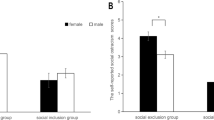Abstract
The present study tested whether socioeconomic status (SES) was linked to differences in the strength of neural empathic responses. Following previous research we measured fronto-central P2 responses to images of neutral faces and faces expressing pain. As predicted we found that higher SES was linked to diminished neural empathic responses. Interestingly, higher SES was positively correlated with self-reported trait empathy, suggesting that those higher in status may not realize that they are actually lower in empathy. Implications and future directions for research on empathy, altruism, and prosocial behavior are discussed.




Similar content being viewed by others
References
Adler, N. E., Epel, E. S., Castellazzo, G., & Ickovics, J. R. (2000). Relationship of subjective and objective social status with psychological and physiological functioning: Preliminary data in healthy white women. Health Psychology, 19, 586–592.
Cohen, A. B., Malka, A., Rozin, P., & Cherfas, L. (2006). Religion and unforgivable offenses. Journal of Personality, 74, 85–117.
Davis, M. H. (1983). Measuring individual differences in empathy: Evidence for a multidimensional approach. Journal of Personality and Social Psychology, 44, 113–126.
Fan, Y., & Han, S. (2008). Temporal dynamic of neural mechanisms involved in empathy for pain: An event-related brain potential study. Neuropsychologia, 46, 160–173.
Kraus, M. W., Côté, S., & Keltner, D. (2010). Social class, contextualism, and empathic accuracy. Psychological Science, 21, 1716–1723.
Muscatell, K. A., Morelli, S. A., Falk, E. B., Way, B. M., Pfeifer, J. H., Galinsky, A. D., et al. (2012). Social status modulates neural activity in the mentalizing network. Neuroimage, 60, 1771–1777.
Piff, P. K. (2014). Wealth and the Inflated Self Class, Entitlement, and Narcissism. Personality and Social Psychology Bulletin, 40(1), 34–43.
Piff, P. K., Kraus, M. W., Côté, S., Cheng, B. H., & Keltner, D. (2010). Having less, giving more: The influence of social class on prosocial behavior. Journal of Personality and Social Psychology, 99, 771–784.
Piff, P. K., Stancato, D. M., Côté, S., Mendoza-Denton, R., & Keltner, D. (2012). Higher social class predicts increased unethical behavior. Proceedings of the National Academy of Sciences, 109(11), 4086–4091.
Sheng, F., & Han, S. (2012). Manipulations of cognitive strategies and intergroup relationships reduce the racial bias in empathic neural responses. Neuroimage, 61, 786–797.
Sheng, F., Liu, Y., Zhou, B., Zhou, W., & Han, S. (2013). Oxytocin modulates the racial bias in neural responses to others’ suffering. Biological Psychology, 92, 380–386.
Singelis, T. M. (1994). The measurement of independent and interdependent self-construals. Personality and Social Psychology Bulletin, 20, 580–591.
Stellar, J. E., Manzo, V. M., Kraus, M. W., & Keltner, D. (2012). Class and compassion: Socioeconomic factors predict responses to suffering. Emotion, 12, 449–459.
Varnum, M. E. W. (2013). What are lay theories of social class? PLoS ONE, 8(e70589), 1093. doi:10.9371/journal.pone.0070589.
Varnum, M. E. W. (2015). Higher in status, (even) better-than-average. Frontiers in Psychology, 6, 496. doi:10.3389/fpsyg.2015.00496.
Varnum, M.E.W., Blais, C., & Brewer, G.A. (2015). Social class affects Mu-suppression during action observation. Manuscript submitted for publication.
Acknowledgments
The authors wish to thank Katja Cunningham for her aid in data collection and Zhenhao Shi for his aid in conducting an earlier pilot with the first author at Peking University.
Author information
Authors and Affiliations
Corresponding author
Rights and permissions
About this article
Cite this article
Varnum, M.E.W., Blais, C., Hampton, R.S. et al. Social class affects neural empathic responses. Cult. Brain 3, 122–130 (2015). https://doi.org/10.1007/s40167-015-0031-2
Accepted:
Published:
Issue Date:
DOI: https://doi.org/10.1007/s40167-015-0031-2




